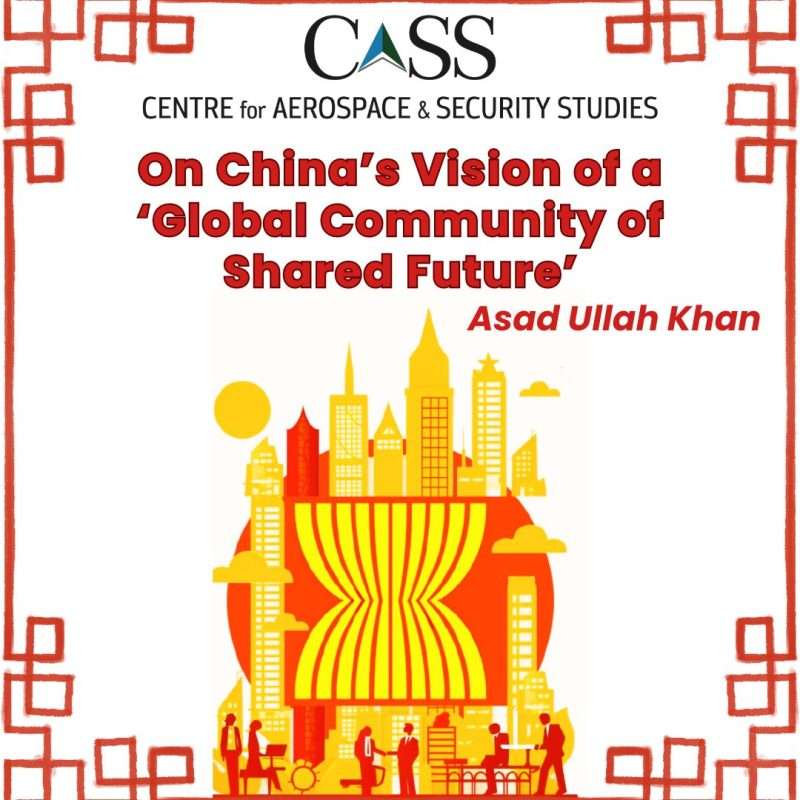Recently in its foreign policy initiatives, China has emphasised the importance of mutual cooperation among nations to meet the collective goals of humanity, which it believes are harmoniously aligned. In this regard, Beijing has issued multiple documents – commonly referred to as white papers – proposing a common vision for a global community of shared future. These documents illustrate the vision China has when it persuades countries to become part of its global development initiatives – characterised by conceptions like the Belt and Road Initiative (BRI).
The latest blueprint for formulating a global community of shared goals and interests highlights President Xi Jinping’s proposal for much needed action for ensuring sustainable development, common progress and a shared vision of prosperity around the world. However, the white paper starts with detaching the vision from ‘hegemonic thinking of certain countries that seek supremacy’ to a goal for global solidarity and multilateral cooperation. The document delineates contemporary global problems – security issues, governance loopholes, hindrances to structural development and peace deficit – while arguing that the world has evolved and has continued to confront critical challenges through interdependence and globalisation and not by unilateral protectionism and hegemonic actions. Urging a reevaluation of international relations amidst pressing global challenges, the document underscores China’s aspiration to integrate with the global community, devoid of any hegemonic intentions or expansionist designs.
Moving away from outdated notions of antagonism, zero-sum competition, and Cold War mentalities, this vision advocates for international engagement rooted in openness, mutual respect, and collaboration. Central to this concept of a shared future is a call to rethink governance, urging inter-civilisational ties and enhanced economic interdependence to foster inclusive growth, respect between nations, and enduring peace. Owing to the new green vision that Beijing has increasingly advocated along with its development programme, the new paper centres the development agenda on the preservation and prioritisation of the Earth and nature. Realisation of such a vision is not possible without exchanges and mutual learning that could enable communities to understand each other, work for inclusive prosperity and, therefore, seek win-win cooperation.
The vision is seen by China observers to be different in one crucial aspect – it connects the endeavour for a shared future with China’s civilisational heritage and broader development consensus characterising the Chinese Communist Party (CCP). While grounding the vision on China’s belief in harmony, co-existence and universal benevolence, the white paper underlines that the vision is very much in line with Beijing’s historical tradition of respect rather than coercion and mutual existence instead of expansion. Furthermore, this vision aligns with the CCP’s track record of modernisation and development. The articulated perspective mirrors the CCP’s practical achievements and philosophical foundation. In foreign relations, the emphasis is clearly on ‘multilateralism’ and fostering ‘greater democracy in international relations,’ drawing insights from other nations’ successes.
Several examples of Chinese policies and projects ranging from proposals to end the Ukraine crisis to proposals for global cultural initiatives are mentioned to make a case for how Beijing’s actions have been true to this vision. Although these political endeavours and development conceptions have a mixed record of completely advancing the principles of this vision, China has shown its intent and muscle to preserve and evolve the values it champions in the domestic and global sphere.
For instance, Beijing has cited how its BRI has been a measure of ‘firm actions and solid actions’ aimed at multilateral cooperation for global interdependence and mutual prosperity. BRI has been a result of extensive consultation and collective action, also seen in other global initiatives – Global Development Initiative, Global Security Initiative and Global Civilization Initiative. Several regional and bilateral initiatives accompany these efforts in order to expand cooperation and build consensual peace and development at the regional level. These instances of collective action are seen as China’s deep economic integration with its neighbouring countries. Moreover, Beijing’s vision to extend partnerships in different realms at once – economic, security, technology, climate and education – has enabled the country and its partners to establish a broad collective vision of cross-sectoral cooperation that is comprehensive and sustainable.
While China’s strength and past successes lend credibility to its forward-looking aspirations, the realisation of these goals will hinge on external determinants: global receptiveness, sustained economic growth in China, and a heightened international drive towards win-win cooperation.
Asad Ullah Khan is a Senior Research Associate at the Centre for Aerospace & Security Studies (CASS), Islamabad, Pakistan. He can be reached at cass.thinkers@casstt.com
Design Credit: Mysha Dua Salman




